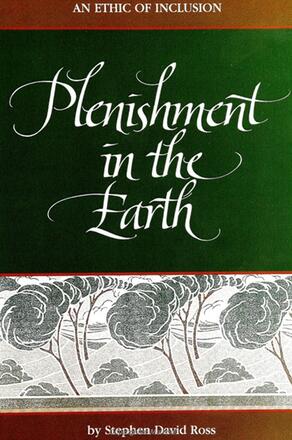Chapter 1 Prelude
Cherishment, sacrifice, plenishment; inclusion and exclusion, domination and subordination. Heterogeneous kinds of the earth. Ethic of sexual difference. Circulation of the good from women to animals to nature, everywhere in the earth, related to natural kinds. Voice and structure of this book. Repeated movements around heterogeneity.
Chapter 2 Rest
Irigaray and question of sexual difference. Spinoza's exclusion of women from ethics. A different ethics. Relation to ecological feminism. Ethics of reading and writing; history of Western philosophy. Modulation from lrigaray's An Ethics of Sexual Difference to The Sex of Ethical Difference , to a sexed and bodily ethics. Ideas of economies, restricted and general, from Bataille. Levinas and endless responsibility. Heterogeneity and gender. The question of our age and impossibility of a universal We.
Chapter 3 Lullaby
Close reading of An Ethics of Sexual Difference . Question of sexual difference as the question of our age. Relation to Heidegger's question of technology. Poiesis and techne. Leading to first philosophy. Sexual difference and gender. Sexual difference and objectivity. Ethical difference and indifference. Place, displacement, places between (aentre ), reste. Intermediary figures. Space and time. Kristeva, Wit-rig. Spinoza's exclusion of women and animals. Kristeva, herethics, the Stabat Mater , ethics of sexual difference. lrigaray's reading of place and rest in relation to excess. Woman as no place. Heterogeneity, embodiment, mucosity.
Chapter 4 Rest
Continued reading of An Ethics of Sexual Difference . Woman as place of place. Aristotle, Plato, Whitehead, Spinoza. Sexual difference and embodiment. Sexual difference and women's jouissance ; ethical difference and jouissance of animals. Music and the Stabat Mater. Ethic of responsibility and proximity, herethics, expressed in song.
Chapter 5 Canon
Radical alterity as heterogeneity, between Levinas and Irigaray. Dyad of gender as a measure and sexual difference as heterogeneity. Dyad as binariness, master-slave, and face to face. General economy as circulation of dyads. Social contract as circulation of women. Foucault's view of power and money as restricted and general economy. Circulation of women and animals. Control of circulation as mastery and culture. Question of Western canon, restricted and general economy of reading and writing. Indefinite dyad in Philebus as account of measure and the good, poiesis and techne . Natural kinds circulating in general economy.
Chapter 6 Rest
Whitehead and dyadic oppositions. Trinh and hegemony of Western culture. Whitehead on public and private. Dewey on experience and nature, means and ends. Lyotard and the Différend , stocking up time. All dissolutions of binary opposition, measure, and restricted economy.
Chapter 7 Carnaval
Radical alterity as heterogeneity, between Levinas and Irigaray. Alterity and dyad human-animal. Heterogeneity face to face in Levinas and love, passing away from subjectivity to animals on the way to nature. Singer's defense of animal liberation, criticized as measured, depending on a criterion. Contrasted with cherishment and plenishment. Comstock on pigs and Taylor on wild living things. Contrasted with cherishment and plenishment. Examples of living creatures and other human beings with a knowledge they may know that we will never know. Derrida and Heidegger on Geschlecht : gender and essence of the human, the gift of language. Related to animal sacrifice. From Geschlecht, dividing humanity from animals, idea of kindred difference, including all kinds of things together in plenishment. History of domination of animals, from Old Testament through Aquinas. Dewey's view of nature as plenitude without exclusion.
Chapter 8 Rest
Ecological feminism. Environmental ethics. The masculine subject and domination of nature. Ethic of care. Gilligan and Nodding. Critique of ethic of care. Critique of bipolar ethics, feminist or otherwise. Critique of choice between ethic of care and of rights.
Chapter 9 Tango
Radical alterity as heterogeneity, between Levinas and Irigaray. Alterity as sexual, erotic, jouissance . Man and woman as categories of gender; gender as heterosexuality. Sexuality as rapture, madness, desire; heterogeneity. Heterogeneity face to face, intimacy, and proximity. Illich's view of vernacular gender and economic sex. Butler's critique of the categories of gender and of Wittig's undivided being and language. Response to Butler from within the univocity of being, language, and gender. Instability of categories of gender expressed as heterogeneity, erotic and altererotic. Derrida's critique of Dasein 's neutrality as repetition of sexual difference. Sexual difference as gentleness, strife, and erotic heterogeneity.
Chapter 10 Rest
MacKinnon's critique of sexuality in societies with gender inequality. Impossibility of love under conditions of gender inequality. Sexual domination and sexual violence. Domesticity, privacy, and subjugation of women, in relation to race, class, and culture. Subjection and abjection. Rape, sexual violence, and sexual intimacy. Ethical danger and proximity. No measurable difference, under law, between sexual violence and sexual intimacy. Proximity and danger, of what we cannot begin to imagine. Arendt's view of public as heterogeneity, no sense of heterogeneity in private. Domiciles as places of danger and violence. Plenishment insists that no kind may be assigned to suffer dangers of proximity.
Chapter 11 Walpurgisnacht
Witches as contaminated figures of destruction and disturbance. Wittig's The Lesbian Body as (lesbianized) rethinking of embodiment, violence, and sexuality, of heterogeneity. Contamination of sexual violence and relation to sacrifice. Witches and goddesses as figures of disturbance and violence.
Chapter 12 Rest
Rainbow-colored heterogeneity disturbing culture's mastery. Multiple kinds and kindred difference. Trinh's Master, First and Third World. Lugones and feminist obliviousness to color. Our own and others' heterogeneity. Our belonging to multiple kinds. Identity and heterogeneity; multiple identity; world-traveling. Nature's heterogeneity; multiple natural kinds. African witches; African philosophy. Intermediary figures and sovereignty. Dixon's account of African and European philosophy. Harding's critique. African and Aboriginal stories. Rejection of dichotomy.
Chapter 13 Rhapsody
General economy, song of the earth. Locality, inexhaustibility, ergonality. Cherishment, sacrifice, plenishment. poiesis and techne joined, not opposing. Work of the good. Sexed rights. Guidelines to an ethic of inclusion.
Notes
Bibliography
Index
